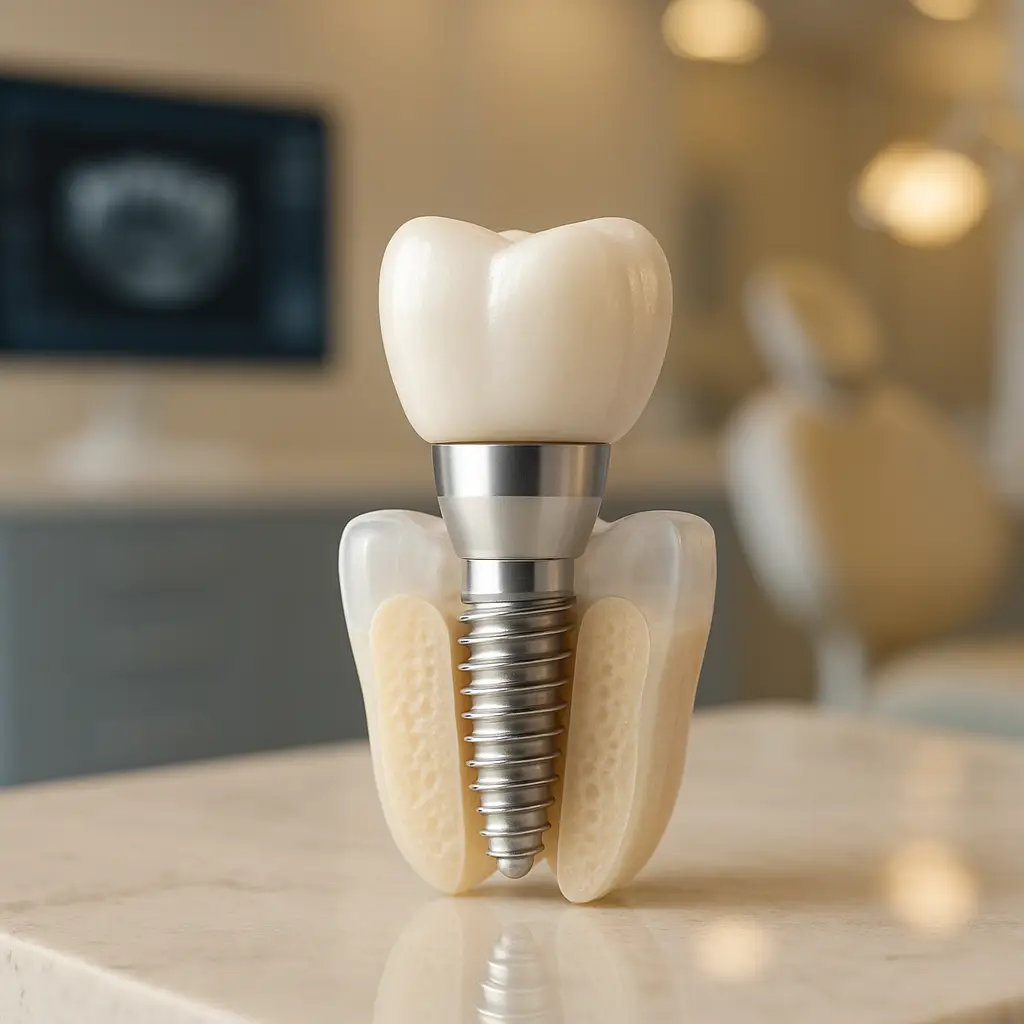What Are Dental Implants?
Dental implants are artificial tooth roots made of biocompatible titanium that are surgically placed into the jawbone. They provide a stable foundation for replacement teeth such as crowns, bridges, or dentures. Over time, the bone naturally bonds with the implant through a process called osseointegration, which secures it firmly in place.
Dental implants are designed to look, feel, and function like natural teeth, helping patients regain confidence and comfort in their everyday lives.
Why Dental Implants Are Often Recommended
Among modern tooth replacement options, dental implants are regarded as a comprehensive and lasting solution. Unlike traditional dentures or bridges, implants replace the tooth root itself, preserving bone structure and preventing the gradual bone loss that often occurs after tooth loss.
Well-placed implants can:
- Restore natural chewing and speaking function
- Provide stability and comfort without the need for adhesives
- Maintain the alignment of surrounding teeth
- Support long-term oral health by distributing bite forces evenly
When cared for properly, implants can last for many years, often decades, making them a dependable option for those seeking long-term function and aesthetics.
The Dental Implant Process
Dental implant treatment is carried out in several stages, each designed to ensure safety, comfort, and precision:
1. Comprehensive Assessment
The process begins with a thorough clinical and radiographic evaluation to assess bone quality, gum health, and overall suitability for implant placement.
2. Implant Placement
The titanium implant is surgically placed into the jawbone under local anaesthesia or sedation. This procedure is performed with careful attention to positioning and bone support.
3. Healing and Integration
Over several months, the implant integrates with the bone. This period allows for stable anchorage before the final restoration is attached.
4. Restoration
Once the implant is secure, a connecting piece (abutment) is attached, followed by a custom-made crown, bridge, or denture that matches the patient’s bite and appearance.
Each stage is managed with a team-based approach, where surgical and restorative specialists collaborate to ensure seamless integration from planning to final restoration.
Factors That Influence the Cost of Dental Implants in Singapore
The cost of dental implants can vary depending on several clinical considerations, including:
- The number of implants required
- The type of restoration (single crown, bridge, or full-arch denture)
- The need for additional procedures such as bone grafting or sinus lifting
- The complexity of the individual case
While dental implants may involve a higher upfront cost compared to other tooth replacement methods, their ability to preserve bone and maintain long-term stability often makes them a worthwhile investment in oral health.
The Importance of Expertise, Experience, and Team-Based Planning
Dental implant treatment is a highly technical procedure that demands not only surgical skill but also precise diagnosis and long-term planning. At Dental Specialists @ Scotts, every implant case is approached collaboratively by a team of dedicated specialists — not as a solo procedure.
Each implant treatment is co-managed by two experienced specialists: one focuses on the surgical placement, while the other oversees the restorative phase, ensuring that both function and aesthetics are meticulously addressed. This multi-specialist approach enhances treatment predictability, improves clinical outcomes, and ensures that every aspect of the patient’s care is thoughtfully integrated.
Our team includes:
- Dr Elvin Leong, Specialist in Oral & Maxillofacial Surgery
- Dr Dephne Leong, Specialist in Prosthodontics
- Dr Daylene Leong, Specialist in Periodontics
This collaborative model ensures that every implant placed is supported by a strong foundation, a beautifully crafted restoration, and long-term maintenance planning — all under one roof.
Caring for Dental Implants
Proper maintenance plays a vital role in the longevity of dental implants. Patients are advised to:
- Brush and floss regularly
- Attend routine dental reviews and professional cleanings
- Avoid smoking, which can affect bone health and healing
With consistent care and professional monitoring, implants can continue to function effectively for many years.
Determining Whether Dental Implants Are Suitable
Not every patient is an immediate candidate for implants. Factors such as bone density, gum health, lifestyle habits, and overall medical condition must be evaluated before treatment. A detailed consultation allows the dentist to determine the most appropriate approach and discuss all available options, including alternatives where necessary.
Dental implants remain one of the most advanced and natural-feeling solutions for tooth replacement. When carefully planned and maintained, they can restore both function and confidence with lasting results.

